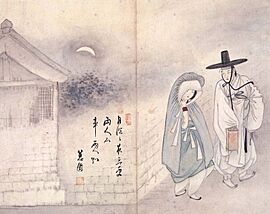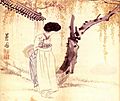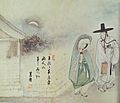Sin Yun-bok facts for kids
| Sin Yun-bok | |
 |
|
Quick facts for kids Korean name |
|
|---|---|
| Hangul |
신윤복
|
| Hanja |
申潤福
|
| Revised Romanization | Sin Yun-bok |
| McCune–Reischauer | Sin Yunbok |
| Art name | |
| Hangul |
혜원
|
| Hanja |
蕙園
|
| Revised Romanization | Hye-won |
| McCune–Reischauer | Hyewŏn |
| Courtesy name | |
| Hangul |
입부
|
| Hanja |
笠父
|
| Revised Romanization | Ip-bu |
| McCune–Reischauer | Ippu |
Shin Yun-bok, better known by his pen name Hyewon (1758–1813), was a Korean painter of the Joseon Dynasty. Like his contemporaries Danwon and Geungjae, he is known for his realistic depictions of daily life in his time. His genre paintings are distinctly more ... than Danwon's, a fact which contributed to his expulsion from the royal painting institute, Dohwaseo. Painting was frequently a hereditary occupation in the Joseon period, and Hyewon's father and grandfather had both been court painters. Together with Danwon and the later painter Owon, Hyewon is remembered today as one of the "Three Wons" of Joseon-period painting.
Contents
Biography
Not much is known about Shin Yun-bok's life. He was the son of royal court painter Hanpyeong (한평; 漢枰), who had participated in painting the royal portraits of Yeongjo and Jeongjo. Hyewon reached the official rank of cheomjeoljesa (첨절제사; 僉節制使) at the Dohwaseo and was adept at different styles of painting; genre, landscape, and animals. It is speculated that he left a great number of paintings due to the popularity of genre paintings during that era.
There are different studies and theories regarding his life, that he may not have ever been a member of the Dohwaseo nor was he on close terms with Kim Hong-do.
Style and legacy
Shin Yun-bok, despite being greatly influenced and overshadowed by Kim Hong-do during his career, developed his own unique technique and artistry. Along with Kim Hong-Do, he is known foremost for his genre paintings of the Joseon era. ..... His choice of characters, composition, and painting method differed from Kim's, with use of bright colors and delicate paint strokes. He also painted scenes of shamanism and townlife, offering insight to lifestyle and costumes of the late Joseon era.
His ink landscape paintings used clear light strokes in a method similar to that of Yun Je-hong (윤제홍), the pioneer in new style painting of the late Joseon era. He is also known to not have used the traditional method of leaving empty space in his paintings, usually filling the whole canvas. Although he placed short verse and his seal on most of his paintings, none indicate the date nor time of their creation and it is difficult to define the progression of his painting style. As one of the pillars of genre painting in the Joseon era, he influenced many other painters afterwards.
His album, Hyewon Pungsokhwacheop, contains 30 of his paintings and was designated the 135th National Treasure of South Korea in 1970.
Famous paintings
- Portrait of a Beauty (미인도; 美人圖): Painting on silk. Depicts the standard of traditional beauty in the Joseon era. Realistic details of the hanbok are notable.
- Dano day (단오풍정; 端午風情): Painting on paper. .....
Gallery
Six paintings from the Yeosokdo Album (여속도첩):
Four paintings from the Pungsokdo Album. See Hyewon pungsokdo for a complete gallery of this album (30 paintings).
Fictional portrayals
Literature
In the novel Painter of the Wind by Lee Jung-myung, Hyewon is portrayed as a woman disguised as a man.
Film and television
- Portrayed by Moon Geun-young and Kim Yoo-jung in the 2008 SBS TV series Painter of the Wind.
- Portrayed by Kim Min-sun in the 2008 film Portrait of a Beauty.
See also
 In Spanish: Shin Yun-bok para niños
In Spanish: Shin Yun-bok para niños
- List of Korean painters
- Korean painting
- Korean art












